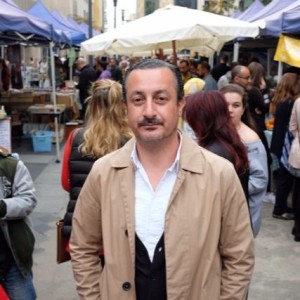
Join Global Consultant Susan Coleman, Host of the Peacebuilding Podcast- and today’s most innovative, courageous and inspired practitioners as we explore strategies to intervene in complex systems to build consensus and common ground across divides of worldview, culture and difference.
Episodes

Tuesday Sep 20, 2016
Episode 017 – Kamal Mouzawak: Making Food Not War in Lebanon
Tuesday Sep 20, 2016
Tuesday Sep 20, 2016
In this episode, Susan interviews Kamal Mouzawak, an Arab world social innovator whose business card says it all “Make Food, Not War”. Kamal created the first farmer’s market in Beirut, Soukeltayeb.com, which means the market of good. Because he grew up in the middle of the Lebanese civil war, he knows first hand about what kinds of actions can build peace. Susan and Kamal met sometime in the Spring of 2016 at the Glynwood Center, glynwood.org, which supports food and agriculture throughout the Hudson Valley of New York in the United States. Kamal and his staff served an amazing meal of goat, hummus, greens, yogurts and more while talking about his work of bringing people together across huge divides in Lebanon of different cultures and religions. As he has said, “in a country as divided as Lebanon, nothing can bring people together as much as the land and food.” In the midst of divisive political tensions still prevalent after the Lebanese civil war (1975 to 1990) and continuing conflict between Lebanon and Israel, Kamal began Souk el-Tayeb. Souk el-Tayeb is the first inexpensive organic food market in Beirut, but more importantly, it serves as a platform for the people of Lebanon to forge a unified Lebanese heritage and identity based on their shared cuisine. A place where regardless of the religion or ethnic heritage—Druze, Shiite, Sunni, Maronite, Greek Orthodox, Jew—the diverse peoples of Lebanon are united around a food experience. Lebanon’s tumultuous history of diversity and conflict has resulted in low agricultural production, massive internal migration, inadequate agriculture policies, and ethnic divisions. For each of these problems, Kamal’s approach is part of a solution. Branching from Souk el-Tayeb, Kamal has begun a farmer visit and exchange program, a cultural tourism program, a producer restaurant, educational programming for youth, and inclusive national festivals to promote reconciliation in Lebanon. While Souk el-Tayeb is based in Beirut, due to Lebanon’s compact size, farmers from the Niha Mountains to costal Saida can join together at weekly farmer’s markets. Additional programs branching from the market, such as the farmer’s exchange program, also connect farmers from across Lebanon in their own homes, and transnationally with investor networks in London, Galway, Amsterdam, New York, and Latakia. Based on the marked success of Souk el-Tayeb in Beirut, and the impact of its related initiatives in other parts of Lebanon, Kamal is working to introduce producers’ restaurants in Dubai and farmers’ platforms in Saudi Arabia. Using cuisine traditions and customs as a unifying social and cultural catalyst while also empowering and generating income to small-scale farmers and local communities—through food, Kamal is scaling peace in the Middle East.
No comments yet. Be the first to say something!